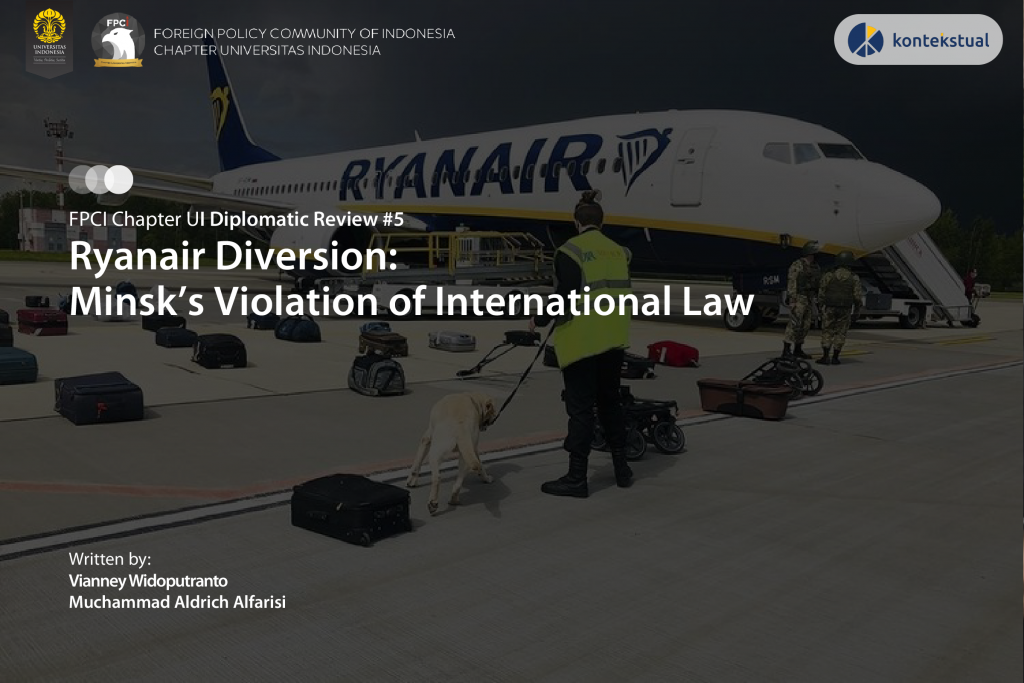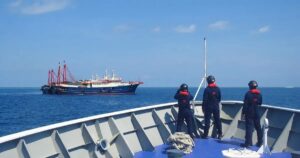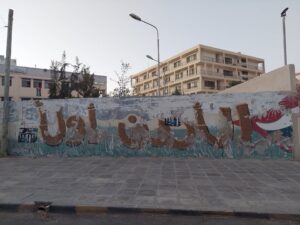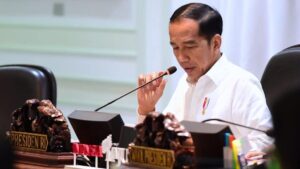RYANAIR Diversion: Minsk’s Violation of International Law

Ilustrasi dari FPCI UI
Outline
On the 23rd of May 2021, a Ryanair aircraft with the flight number of 4978 was traveling from Athens to Vilnius. The aircraft was passing through the Belarusian airspace, when suddenly it was diverted and escorted by a Belarusian fighter jet to the capital of Belarus, Minsk. Minutes after the diversion, it was told by the Belarusian officials that the reason for the diversion was a bomb threat onboard. Once landed, arrests were made on several passengers, one with the name of Roman Protasevich, a 26-year-old Belarusian journalist and activist, who is living in exile due to his role in the opposition of the Belarusian government.
This event generated condemnation from a lot of sides, mainly from the EU, labelling the Belarusian action as a form of “hijacking” and a “serious attack on the rules governing civil aviation”. This statement is later followed by demands to release the prisoners and also a call for investigation for the controversial action. Others accuse that the diversion was a form of crackdown by the Belarusian president, Alexander Lukashenko, towards the opposition movement, in the efforts to maintain his political power after his win in the questionable election held in August 2020. President Lukashenko has been in office since 1994 and has turned Belarus into a dictatorship, which has led western European countries to label him as “Europe’s last dictator.” Throughout the years, crackdowns of anti-government protests, intimidation of political opposition, and arrests of journalists have been conducted during Lukashenko’s regime. These actions have raised many movements by the Belarusian public to struggle against the dictatorship which also inspires the aforementioned Roman Protasevich to join the movement since his youth.
The Ryanair incident can also be linked to a grander topic of the rugged relationship between the EU and Belarus, whose sole ally is Russia. As previous sanctions and condemnation by the countries of EU towards Belarus are deemed ineffective, the act of forceful flight diversion brings out the larger scale of international law to the table and the decision carried out by the Belarusian president might have been a step too far. In this article, we would discuss deeper about Lukashenko’s rise to power, rising movements against Lukashenko’s regime until recent events, EU’s responses regarding the event, implication of the incident toward international law, and what can be done to weather out the problem.
The Rise of Lukashenko’s Regime
Before Lukashenko’s came to power, Belarus was part of the Soviet Union until its independence in 1991. Belarus was one of the Soviet countries that underwent social and political unrest due to the economic and political instability caused by neighbouring Eastern Europe conditions and the effects of the Cold War. Following its independence, Belarus had a system of democracy and the rule of law as its core principles. However, it did not last long as the general election held in 1994 resulted in the win of Alexander Lukashenko as the new President of Belarus.
In the early years, Lukashenko implemented a direct and intense control by concentrating the economic and political power of the country, with the objective of recreating a Soviet-style command economy to recover from the Post-Cold War conditions. This has proven to be quite successful through his achievement of reducing the country’s unemployment rate below one percent by maintaining the state’s control of enterprises which are tasked with employing the majority of the workforce. The relatively successful economic recovery also produced a significant amount of support to enable him to extend his term, exceeding the previous limit by amending the constitutional limit of two five-year terms in 2004. Lukashenko also altered the governmental system by compromising the check-and-balance mechanisms of the legislature which then strengthened his control over the country.
Another factor which supports Lukashenko’s capability of maintaining his powers in Belarus is his relations with Russia. After the fall of Soviet Union, Russia and Belarus remained close in relation. This is shown by political, economic, and diplomatic support that are given by Russia in order to gain geostrategic and economic advantage for both countries. This has proven to be massively beneficial for Belarus’ economy to grow especially during the Lukashenko-Yeltsin era. Several of its benefits are the free access of Russia’s market to Belarus, willingness of Russia to write off Belarus’ debts, and the mutual military cooperation as well as the defence of the region.
In another matter, Russia also endorses the relations with Belarus during the Lukashenko-Putin era in need of a reliable support of authoritarian governments beyond its borders. One of the reasons for this support is to stem the rising democratic movements throughout the former Soviet nations in the 21st century. One of the cases that boosts the authoritarian relation between Russia and Belarus is the Ukraine’s Orange Revolution in 2004 which sent out an alarming message to the rest of the authoritarian regimes in the region. With Russia still showing some tendencies of an authoritative system, this movement could potentially spark the public within authoritarian states to press for systemic change. Therefore, Russia and Belarus embarked upon a counter to halt the contagion of democratic values into their nations by carrying out a strategy known as preemptive authoritarianism.
Preemptive authoritarianism is a strategy in which a country prevents a potential democratic challenge to rise even though the challenge itself may not yet be identified as a threat. This prevention strategy is fuelled by observing previous authoritarian regimes in neighbouring areas fall before democratic movements. The ways to implement the strategy itself are varied, but the common ones are preemptive strikes against pro-democracy movements, criminalize opposition activities, and instigate public fear against the prospect of regime change. The strategy identifies competitive elections, independent media, and a civil society as potential promoters of democracy which needs to be supervised.
One model of a preemptive authoritarianism is the propaganda technique of linking democratic movements as a window for terrorism. The Russian government is known to have done this kind of method and it is assumed they also attempted to help Belarus to do the same. One instance was the statement of Russian FSB Director, Nikolai Patrushev, in May 2005, mentioning that unspecified terrorist organizations were funding the Belarusian opposition leading to the presidential elections in 2006.
Although a lot of efforts have been made by the Belarusian government to keep democratic values away, its people do still feel discomfort by the lack of freedom provided by its government. The remnants of the past democratic movements before independence and the brief democratic system before Lukashenko inspired efforts by the opposition to disassemble the authoritative regime that had been oppressively leading their country for decades. In the next section, this article would discuss the history of the Belarus oppositional democracy movement.
The Struggle Against Lukashenko’s Regime
The democratic struggle against Lukashenko’s regime has existed since Lukashenko himself rose to power. The struggle itself was a form of response by the Belarusian public regarding the repression that had been conducted by the government to secure the control of the country. Actions such as repressions on independent media which started in 1996, amendment of the limit of presidential terms in 2004, limitations of democracy advocating NGOs in 2005, and among other things shows the authoritative motive of the new regime. In response, the Belarusian opposition created independent organizations to fight back against the oppression, one of which is the youth movement that gained a lot of coverage in recent years.
One of the well-known youth movements in Belarus was the Zubr organization which was created in 2001 as a continuation of the previous Malady Front/Youth Front of 1997. Their prominent activities to oppose the government were instantly marked as an unauthorised organization in Belarus and its members are often harassed and potentially faced persecution by the police. Nevertheless, Zubr was one of the first actors to demonstrate against the activities of the government by conducting a protest for the missing of opposing politicians and a journalist who implicated potential kidnappings conducted by the government. This action generated support by the public which resulted in a wider mobilization in their next demonstrations.
Zubr movements grew bigger as more independent movements joined their cause of pressing for a regime change and demanded democratic values of freedom resulting in a lot of support from similar movements from neighbouring countries. Their peak struggle happened in the year of 2006 when the presidential election took place. In the efforts to restrain Zubr movements, the government created a similar youth movement known as the Belarusian Republican Youth Movement (BRSM) to grab the support from the youth and weaken Zubr. Nevertheless, Zubr still managed to develop a wide national network of activists across 152 towns in Belarus to strengthen the opposition in the election. However, several months after the election, Zubr ceased to exist.
Although Zubr did not continue to present times, the impact Zubr had towards Belarus’ public gave the democratic movements the spirit to keep on the struggle against the regime. This is reflected by the recent movements against the repression of press and media in Belarus by utilizing a new messenger app known as Telegram. Telegram’s capability of avoiding government censorship gave a way to democratic movements to communicate and coordinate protests during the controversial 2020 election. The movement also uses Telegram to design a system of information to communicate the struggle of the democratic movement in Belarus towards international audiences with their channel known as NEXTA. The channel itself has grown significantly since its creation which resulted in a lot of attention and donations gained from all around the world. Responding to this oppositional growth, Lukashenko decided to carry out a series of crackdowns in which one of them is the capture of Roman Protasevich, the editor-in-chief of NEXTA.
International Responses
Belarus, on 23rd of May 2021, forced a passenger plane carrying a wanted opposition activist to divert and land in its capital, provoking a flurry of furious outcry from world leaders ahead of an EU summit Monday expected to toughen sanctions on Minsk over a separate case of opposition suppressing in the wake of the 2020 Election results.
The Ryanair diversion incident comes as the European Union is set to discuss tightening sanctions against Belarus over the crackdown by Lukashenko’s regime against opposition protestors in the wake of the results of the 2020 Election. The United States “strongly condemned” the arrest, with Secretary of State Antony Blinken stating, “This shocking act perpetrated by the Lukashenka regime endangered the lives of more than 120 passengers, including US citizens,” he later added on Twitter: “We demand an international investigation and are coordinating with our partners on next steps.”
European leaders have reacted swiftly, with President of the European Commission, Ursula von der Leyen stated in a tweet that “The outrageous and illegal behaviour of the regime in Belarus will have consequences. Those responsible for the Ryanair hijacking must be sanctioned. Journalist Roman Protasevich must be released immediately. EUCO will discuss tomorrow what action to take.” Poland’s Prime Minister Mateusz Morawieck also took a strong stance, stating that Belarus’ actions are “an act of state terrorism,” with French Foreign Minister Jean-Yves Le Drian called for a united response from Europe. Greek Prime Minister Kyriakos Mitsotakis tweeted that “The forced landing of a commercial plane to detain a journalist is an unprecedented, shocking act.” With Lithuanian President Gitanas Nauseda going so far as to describe Belarus’ actions as “abhorrent.” The Irish Government, where Ryanair is based, described the incident as “absolutely unacceptable”, while NATO called it “dangerous” and demanded an international investigation. Ryanair CEO Michael O’Leary stated on Irish Radio that the incident was a “case of state-sponsored hijacking and state- sponsored piracy.” The International Civil Aviation Organization stated that the forced landing “could be in contravention of the Chicago Convention”, which protects nations’ airspace sovereignty. And the EU and the United States have sanctioned Lukashenko and dozens of officials and businessmen tied to his regime with asset freezes and visa bans.
Recently, European Union member states have agreed to impose additional sanctions on Belarus over Minsk’s forced diversion of a Ryanair flight and arrest of dissident journalist Roman Protasevich. The new measures targeted at least seven individuals, as a stop-gap measure while economic sanctions are discussed, linked to the Belarusian aviation sector with the block already restricting Belarusian airlines from flying over European Union territory or having access to its airports and stopping carriers from the 27 member nations from passing Belarusian airspace. The EU has already placed numerous individuals, including Lukashenko and his family, on an asset freeze and visa ban. With further economic sanctions being discussed are expected to target bond sales, the oil sector and potash, in order to inflict maximum economic pain towards Lukashenko.
Protasevich Capture as a Violation of International Law
The full details surrounding the events of May 23rd remain blurry at its best. The Belarusian authorities claim that they had received an anonymous letter claiming that Hamas had planted a bomb aboard Ryanair flight 4978. As a result of that the Belarusian authorities ordered the flight to land the aircraft to confirm the bomb threat. Lukashenko later told parliament the email originated in Switzerland. However, Swiss authorities say they know nothing about the claim, with Swiss email provider Proton Technologies saying it had not seen any credible evidence that the Belarusian claims are true. This claim appears doubtful at best, it is unclear why the informant would notify the government of Belarus rather than the government of Lithuania or Greece, where the aircraft was headed and originated from. Other than that, the aircraft was physically closer to Vilnius than to Minsk. If the wellbeing of the passengers and crew were the primary concern of Minsk, then logically speaking, they would’ve notified Lithuanian authorities and allowed the plane to safely land in Vilnius. The dispatching of a MiG-29 to “escort” the aircraft to accompany it to land at Minsk National Airport also raised significant concerns.
From a legal perspective, there are two main questions regarding Minsk’s actions. The first is whether it had the power and authority to divert the aircraft from its intended route and to justify the use of a military aircraft in escorting Ryanair flight 4978 to land and the second question is whether it had the jurisdiction to detain Protasevich in the first place.
The justification of the interception of the plane by a MiG-29 was its safety due to the suspected bomb threat on board. The method used by Belarus to order the pilot to land in Minsk may be legally significant. The Convention on International Civil Aviation of 1944 (The Chicago Convention) does authorize countries to order a civil aircraft flying in the country’s sovereign airspace to land, however, the country must have reasonable grounds to do such an action. The Chicago Convention requires state parties to issue emergency landing orders in compliance with national regulations regarding the interception of civil aircraft. In essence, it is for Belarus to prove that it complies with the “reasonable grounds” and compliance with the national laws clause. Salvatore Sciacchitano, the current president of the Council of the International Civil Aviation Organization (ICAO) has called an emergency meeting of the 36-member state council to discuss the incident and as a result of that is seeking an official explanation from the Belarusian government and opening a fact-finding investigation regarding the circumstances surrounding Ryanair flight 4978.
The detention of Journalist Roman Protasevich itself presents a whole other set of legal questions. Under the Chicago Convention, Ryanair Flight 4978 at the time was under the legal jurisdiction of Poland, as the aircraft in question (a Boeing 737-800 registered as SP-RSM) was and is registered under BUZZ, a polish-based subsidiary of Ryanair. No country has the right to detain an individual on a civil aircraft for crimes not committed on board that aircraft. From what is known, Belarussian authorities have detained Protasevich for alleged crimes that have no connection to the flight, let alone that were committed on the flight. Per international customary law, what Belarus should’ve done is applied for extradition to Warsaw or Vilnius (Poland as the country where the aircraft is legally registered and Lithuania as the country of destination).
However, if Minsk were to take that route, Poland could justly bring legal charges against Belarus for violating rights under the Chicago Conventions as the country of registration for the aircraft. Another legal action that could be brought against Belarus is its reporting to the International Court of Justice by other state actors on the basis that Belarus’ actions have threatened the global system of aviation, of which a similar case was brought against France when in 1956 it detained a Moroccan aircraft to arrested Algerian rebel leaders travelling to a conference.
Another technicality as a result of international aviation law is that Roman Protasevich was technically detained by Belarusian authorities on Polish territory. Poland, as the country of registration for the aircraft, is a member of the European Convention on Human Rights, where the detention of Protasevich may violate his right to liberty. It could be argued that while Poland is not responsible for the arrest of Protasevich, Warsaw could violate the Convention if proven that it failed to exercise due diligence to secure its release. In the jurisprudence of the European Court on Human Rights (a body resulting from the European Convention on Human Rights), it has shown that the convention applies to aircraft and ships that are registered under the flag of a contracting party. Poland has issued a public condemnation of Belarus’ actions, so far as to call it “an act of state terrorism,” under the ECHR, Poland is obliged to take more practical steps within its power to secure the release of the detained persons on the basis that their detention was unlawful.
All-in-all, it is safe to say that however you look at it, a violation of international law by Belarus was done during the events of May 23rd, 2021 whether we are looking at it from the perspective of Belarus’ power and authority to divert the aircraft from its intended route or from its jurisdiction to detain Protasevich in the first place or from its jurisdiction to detain Protasevich in the first place.
What Can Be Done to Pressure Lukashenko?
The root to this problem is Lukashenko’s illegitimate rule, for which political prisoners may serve dual purposes: firstly, to suppress dissent and to negotiate with the West and secondly, to extort concessions to his rule. Currently, the regime’s sole foreign lifeline is Moscow, but relations between Moscow and Minsk are anything but easy because of the Kremlin’s desire for Lukashenko to integrate deeper with Russia, of which Lukashenko declines to do. Lukashenko in turn wants Moscow to support Belarus financially and economically, where Lukashenko has viewed Russia’s support as half-hearted. In Moscow, the security services are in favour of supporting Lukashenko at almost any cost whilst other ministries and government branches seem to be more sceptical, with some questioning the wisdom of keeping the besieged president afloat.
It is on this divide that the EU could play a role. By forbidding the trade of Belarusian issued government bonds and imposing sanctions on the country’s oil and chemical industry, Brussels could drastically increase the price Moscow has to pay to maintain its relations and support of Minsk. Optimistically, with the imposition of the ban, the Kremlin would then be forced to consider other policy options. Bringing about a strong reaction is not that easy in the European Council, despite the rapid show of unity during the immediate aftermath of Flight 4978. There are doubts as to what extent sectoral sanctions should be applied and whether or not economic pressure may drive Minsk further into Russia’s hands. Artyom Shraibman, a Minsk-based non-resident fellow at the Carnegie Moscow Center stated that EU sanctions could “irritate Lukashenko and he might escalate more, there’s no way he’ll soften his stance without getting Russia involved in the process, or raising the costs of this for Russia. Because for now Lukashenko feels like Russia is backing him up, and he’s doing whatever he feels like”
With that being said, research conducted by Deutsche Welle, showed that sanctions against moderate autocracies were indeed effective. According to the research, one in two sanctions were successful, and only 16% failed. The University of Würzburg’s democracy matrix considers countries like Russia or Turkey to be moderate autocracies, while Belarus is shifting to a hard autocracy. With hard autocracies, the risk of failure rose to 29%, while the success rate fell to 26%. “We can see this effect in Iran and North Korea, for example,” said Katrin Kamin of the Kiel Institute for the World Economy.
In essence, sanctions are effective only when there is unity in the implementation of it. The bigger the nations or group of nations that support the sanctions against the target country, then the harder it is for the target country to mitigate the consequences. If one country breaks the line, then it is enough to dampen the impact of the sanctions. With that being said, nothing much of sanctions can be done by the international community when it comes to pressuring Lukashenko, except maybe a cut off of support by its sole ally, Russia.
Conclusion
The Ryanair incident cannot be discussed holistically without it being linked to a grander topic of the rugged relationship between the EU and the support of Russia to Belarus. Numerous efforts have been made by the Lukasenko’s regime to keep democratic values away, its people do feel discomfort by the lack of freedom provided by its government, where this situation has inspired the opposition to attempt to disassemble the authoritative regime that had been oppressively leading their country for decades.
The use of a new messenger app known as Telegram, which has the capability of avoiding government censorship, gave a way to democratic movements to communicate and coordinate protests during the controversial 2020 election. The movement also uses Telegram to design a system of information to communicate the struggle of the democratic movement in Belarus towards international audiences with their channel known as NEXTA.
However you look at it, a violation of international law by Belarus was done during the events of May 23rd, 2021 whether we are looking at it from the perspective of Belarus’ power and authority to divert the aircraft from its intended route or from its jurisdiction to detain Protasevich in the first place.
As a result of the actions of Lukashenko’s regime, the European Union member states have agreed to impose additional sanctions on Belarus. The new measures targeted at least seven individuals linked to the Belarusian aviation sector with the block already restricting Belarusian airlines from flying over European Union territory or having access to its airports and stopping carriers from the 27 member nations from passing Belarusian airspace. With further economic sanctions being discussed, which are expected to target bond sales, the oil sector and potash, a big Belarusian export, to inflict economic pain towards President Lukashenko.
The sanctions mentioned above are effective only when there is unity in the implementation of them. If one country breaks the line, then it is enough to dampen the impact of the sanctions. With that being said, nothing much of sanctions can be done by the international community when it comes to pressuring Lukashenko, except maybe a cut off of support by its sole ally, Russia.
References can be accessed through bit.ly/DipRevBelarusReferences
Muchammad Aldrich Alfarisi & Yohannes Maria Vianney Widoputranto are Staffs of Research and Analysis FPCI Chapter UI Board of 2021.







